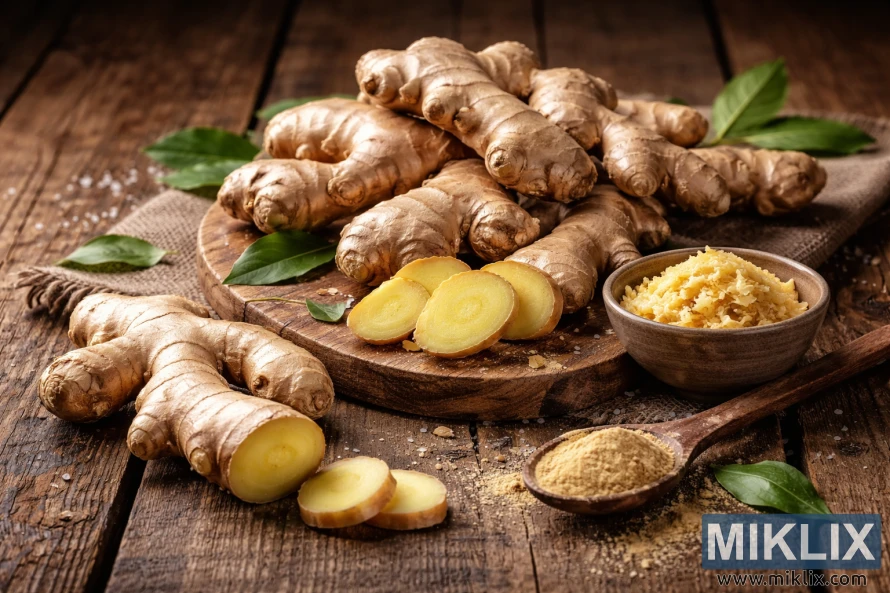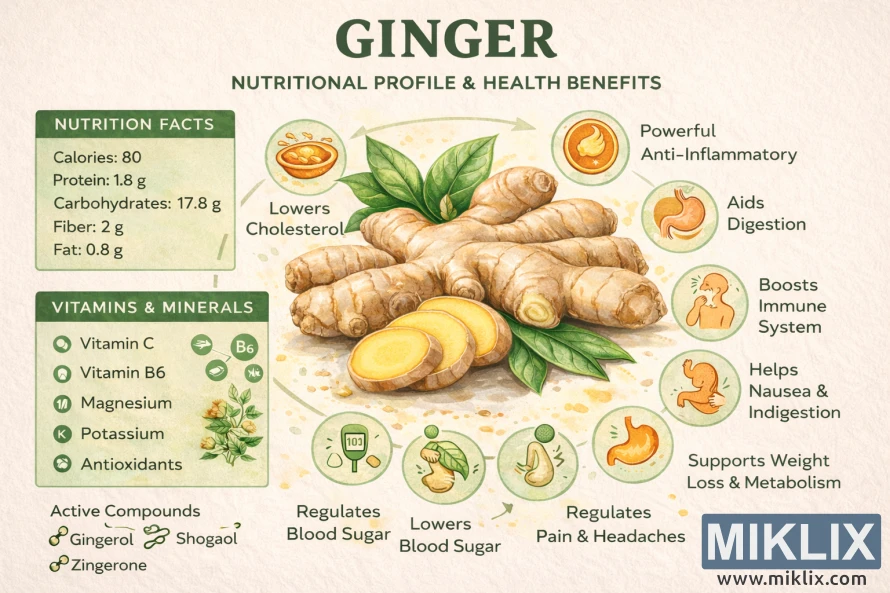Ginger and Your Health: How This Root Can Boost Immunity and Wellness
Published: April 3, 2025 at 4:21:13 PM UTC
Last updated: January 1, 2026 at 11:11:09 PM UTC
Ginger comes from the root of the Zingiber officinale plant. It's not just a spice, but a health powerhouse. This root is packed with medicinal properties that have been used for centuries. Adding ginger to your food or drinking ginger tea offers more than just flavor. It helps with digestion and reduces inflammation. Ginger is a great addition to your daily meals, thanks to its many benefits.

Key Takeaways
- Ginger has numerous health benefits, including anti-inflammatory and antioxidant properties.
- Incorporating ginger into your meals can enhance digestion and reduce nausea.
- The active compounds in ginger, like gingerol, contribute to its medicinal properties.
- Regular consumption of ginger may assist with weight loss and metabolic health.
- Ginger can be used as a natural remedy for various ailments, making it exceptionally versatile.
Introduction to Ginger and Its Uses
The ginger plant, known as Zingiber officinale, comes from Southeast Asia. It's closely related to turmeric and cardamom. The part we know as ginger is actually its root.
Ginger is loved in kitchens and health stores worldwide. It's known for its strong taste and health benefits.
In cooking, ginger is incredibly versatile. Chefs use it fresh or dried in many dishes. It adds flavor and helps with health. For centuries, ginger has been used in traditional medicine for many health issues.
Ginger's popularity keeps growing. It's key in cooking, medicine, and even skincare. Its strong taste and health perks make ginger a great choice for a healthier life.
What is Ginger Good For?
Ginger (Zingiber officinale) is known for its health benefits. It contains a compound called gingerol. This ingredient helps with digestion and overall health.
Ginger is great for digestion. It helps food and gas move through your stomach. This can help with bloating and indigestion. It also helps make bile, which is important for fat digestion.
Ginger is also good for reducing nausea. Studies show it works by affecting serotonin receptors in the stomach. This makes it safe for pregnant women, those with motion sickness, and people undergoing chemotherapy.
Ginger has anti-inflammatory properties. It reduces inflammation in the stomach. This can help with conditions like osteoarthritis and rheumatoid arthritis. Studies show ginger can lessen pain and stiffness in these conditions.
Health Benefits of Ginger
Ginger has been used for medicine for a long time. It's a key part of many cultures. Its health benefits come from special compounds and its healing powers. Gingerol is a big reason why ginger is so effective.
Studies show ginger can reduce inflammation and stress. These are big factors in many diseases. This makes ginger a strong ally in fighting chronic illnesses.
Ginger also helps with digestion and nausea. It's a natural way to keep your stomach happy. The gingerol in ginger makes it a great natural remedy.
Research is looking into ginger's role in preventing cancer. Early results are promising. Ginger might slow down some cancer cells. This shows ginger's wide range of health benefits.

Nausea Relief from Ginger
Ginger is known for its ability to treat nausea, making it a favorite for many. It's even more helpful during pregnancy when morning sickness is common. Studies show ginger can help ease these symptoms, giving a natural choice instead of harsh medicines.
This root helps the stomach empty faster, which lessens discomfort. Ginger's natural compounds soothe the stomach. It's a top pick for nausea, including when caused by chemotherapy. For those looking for a natural way to fight morning sickness, ginger is a safe and effective choice.
Ginger for Digestive Health
Ginger is known for its benefits to the digestive system. It can help with bloating, gas, and discomfort. Its natural properties make it great for speeding up digestion.
Adding ginger to your meals can greatly improve your digestion. For those with indigestion, ginger tea or ginger-infused dishes are good options. Using ginger regularly can make digestion more efficient and keep your digestive system balanced.
Weight Loss Benefits of Ginger
Ginger has become popular for helping with weight loss. Studies show it can boost metabolism. This makes it a good addition to diets for managing obesity.
Research suggests ginger can lead to weight and waist size reductions. This makes ginger a natural option for improving health. The compounds in ginger, like gingerol, are key to these benefits.
In short, ginger is good for weight loss by improving metabolism and managing obesity. You can add it to meals, drinks, or eat it fresh. It's a tasty way to support your weight loss journey.
Managing Arthritis and Inflammation with Ginger
Ginger is a strong ally for those with arthritis and other inflammatory conditions. Studies show it can help reduce pain and stiffness. This is good news for arthritis sufferers.
Adding ginger to your diet can help manage inflammation. It might lessen symptoms, giving a natural option instead of drugs.
Many people drink ginger tea or add fresh ginger to their food. Here are some ideas for using ginger:
- brew ginger tea and enjoy it daily
- add grated ginger to stir-fried vegetables
- mix ginger powder into smoothies for an anti-inflammatory boost
- use ginger in marinades for meats and fish
Using ginger in your meals can make them taste better and be healthier. Its special compounds offer hope for those fighting inflammation.
Heart Health and Blood Sugar Control
Research shows ginger can be good for your heart. It helps reduce inflammation and improves blood flow. Eating ginger regularly can make your heart healthier, adding to a good diet.
Ginger also helps control blood sugar levels. Studies show it can lower fasting blood sugar and improve HbA1c. This is great for people with type 2 diabetes, helping them manage their blood sugar naturally.
Adding ginger to your meals can boost both heart health and blood sugar control. As more people learn about its benefits, they're looking to include ginger in their daily lives. It's a natural way to support a healthy lifestyle.

How Ginger Affects Menstrual Symptoms
Ginger is a natural remedy for menstrual pain. Many women turn to ginger to ease their cycle discomfort. Studies show ginger can be as effective as over-the-counter pain meds for menstrual cramps. This makes ginger a top choice for natural relief from dysmenorrhea.
Using ginger can help by:
- Reducing inflammation.
- Relaxing muscles.
- Enhancing blood flow.
Adding ginger to your routine can make your menstrual cycle more comfortable. You can enjoy it as tea, in food, or as a supplement. Ginger is a flexible option for those looking for relief.
Ginger's Role in Cancer Prevention
Research on ginger's benefits for cancer prevention is growing. Early studies show ginger might help fight certain cancers like colorectal and pancreatic. Its antioxidants and anti-inflammatory properties are key to these benefits.
Many people want to add ginger to their diet for health reasons. Talking about ginger's role in cancer prevention can make it more appealing. It shows ginger's flavor and health benefits go hand in hand, encouraging more research.
Immune System Support with Ginger
Ginger is key in boosting the immune system, making it great for everyone's diet. Its immune support comes from fighting off harmful pathogens. Studies show ginger has antibacterial properties, stopping harmful bacteria and viruses.
Ginger's natural compounds help lessen illness severity and duration. Eating ginger regularly, in teas or meals, boosts the body's infection-fighting power. This leads to better health overall.
Adding ginger to your daily life adds flavor and strengthens your immune system. It has many benefits, from fighting infections to reducing inflammation. So, it's a natural way to improve your health and well-being.
Fresh Ginger Versus Ginger Powder
Ginger comes in two main forms: fresh ginger and ginger powder. Each has its own benefits and uses in cooking. Fresh ginger gives dishes a strong flavor and more nutrients.
It's great when grated or juiced, adding a unique taste to food and drinks.
Ginger powder, on the other hand, is easy to use and store. It's perfect for adding flavor to soups and baked goods. It lasts longer than fresh ginger, making it convenient for quick recipes.
When comparing ginger roots, fresh ginger might have more active compounds. But dried ginger keeps some health benefits in a concentrated form.
Choosing between fresh ginger and ginger powder depends on personal taste. Cooks might prefer fresh ginger for its bold flavor. Others might find ginger powder easier for daily recipes.
Knowing the advantages of each helps people decide how to use ginger in their meals.
Should You Take Ginger Supplements?
Ginger supplements might seem like a good idea because they pack a lot of benefits. But, many experts say it's better to get ginger from food. Food not only tastes great but also gives you lots of nutrients that supplements often don't.
Eating fresh or dried ginger in your meals or drinks is a healthier way to get its benefits. It's a more natural approach to staying healthy.
There's a big worry about ginger supplements. The supplement world isn't as tightly controlled as food. This means there can be problems with what's in them and how well they're made. So, it's important to be careful before adding any supplements to your daily routine.
Adding ginger to your food through different recipes is a smart move. It lets you enjoy its benefits and get extra nutrients from whole foods. You can add ginger to teas, stir-fries, and baked goods. It makes your meals tasty and boosts your health.
Creative Ways to Include Ginger in Your Diet
Ginger is a versatile root that offers many health benefits. It can also make your meals taste better. You can peel and slice fresh ginger to make a refreshing ginger tea. This tea is great for nausea and digestive issues.
Ground ginger is often used in baking. It's perfect for cookies, cakes, soups, stews, and meat dry rubs. This adds flavor and nutrition to your dishes.
Minced or grated fresh ginger is amazing in stir-fries. It pairs well with tofu, chicken, snap peas, and red peppers. This makes your dish vibrant and flavorful. Ginger also boosts your health.
A roast lamb shoulder recipe is a great example. It uses fresh ginger and turmeric for a flavorful and colorful dish. Both ingredients have anti-inflammatory properties.
If you love sweets, ginger is great in desserts. Try the Cranberry and Candied Ginger Buckle. It combines tart cranberries with spicy candied ginger. This cake is festive and nutritious.
Exploring ginger recipes can add unique taste and health benefits to your meals. Finding new ways to use ginger can make your meals more enjoyable and healthy.
Making Ginger Tea: A Healthy Drink
Ginger tea is a favorite drink that warms the heart and offers many benefits. Making it at home is simple and rewarding. With just a few ingredients, you can enjoy ginger's health benefits and its comforting taste.
To learn how to make ginger tea, start with fresh ginger root. Here’s a simple recipe:
- Peel and slice 1-2 inches of fresh ginger root.
- Boil 2 cups of water in a pot.
- Add the ginger slices to the boiling water.
- Let it simmer for about 10-15 minutes, depending on your desired strength.
- Strain the tea into a cup.
- You can add honey or lemon to enhance the flavor.
For those looking to explore various ginger tea recipes, consider adding herbs such as mint or chamomile for added benefits. Experimenting with spices like cinnamon or turmeric can create a unique flavor profile while maximizing health advantages.

Ginger Side Effects and Precautions
Ginger is known for its health benefits. But, it's important to know about some side effects. Most people can safely eat ginger in small amounts. Yet, there are some things to watch out for.
Some people might feel stomach pain or have digestive issues with too much ginger. If you're taking blood-thinning drugs, ginger could make bleeding more likely. Here are some key precautions:
- Always talk to a doctor before using ginger, if you have health problems.
- Don't eat too much ginger if you're pregnant, as it might cause contractions.
- Watch how your body reacts to ginger to spot any bad effects.
Knowing these safety tips helps you enjoy ginger's benefits without risks.
Conclusion
Ginger is a vibrant root that offers many health benefits. It helps with nausea and improves digestion. It also has anti-inflammatory properties.
Ginger can help manage weight and support heart health. It even boosts the immune system. This makes ginger a key part of healthy diets.
Ginger comes in many forms, like fresh, powdered, or supplements. There are many ways to add it to your meals. These benefits make ginger a great choice for better health.
Enjoying ginger tea or adding it to meals can greatly improve your health. Its wide range of benefits supports a healthy lifestyle. Many people aim for this kind of wellness.

Further Reading
If you enjoyed this post, you may also like these suggestions:
- From Fatigue to Fuel: Unlocking Peak Performance with D-Ribose
- A Clove a Day: Why Garlic Deserves a Spot in Your Diet
- Low-Carb Hero: The Surprising Benefits of Cauliflower
